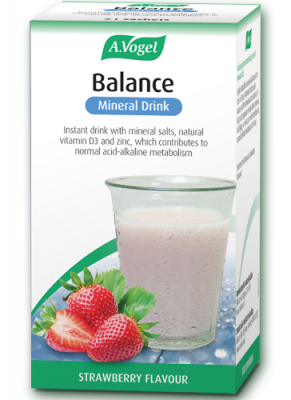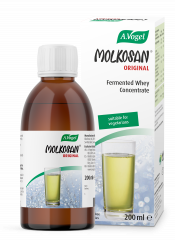The holistic approach explained
Here at A.Vogel we take a holistic approach to health. This means we believe in combining the use of complimentary remedies, often from different disciplines, such as nutrition, herbalism and homeopathy in order to promote optimal health.
So, as much as we believe good health is centred on a good diet, if someone is deficient in certain nutrients, for example, of course we often find it quite appropriate to recommend they take a nutritional supplement in order to help correct that particular imbalance.
Herbs can also be helpful to help prevent or treat some mild symptoms in many cases, and beyond this, if the herbs aren’t proving quite enough, a short-term course of medication may be required to get tricky symptoms under control initially. Then, with any luck, its back to employing a good diet and lifestyle in order to support yourself naturally. Simple! Well, in theory that is!
Are supplements really pointless?
Recently, however, some of even the most popular food supplements out there have been given some bad rap and you may have been wondering if it’s even worth you taking them at all. Is it all really down to diet or can some extra support be helpful in some cases?
Here I run through some common examples, explain what to look out for and what the best approach is going forward:
1. Vitamin A

What’s the story?
Vitamin A has recently been subject to some criticism and you may be wondering if it’s been justified. As a nutritionist I can appreciate that vitamin A is an essential nutrient – this means we can’t manufacture it in our bodies so therefore need to acquire it in sufficient amounts from our diet. Vitamin A is important for supporting our eyes, skin, bones and the delicate mucous membranes that line our lungs, digestive and urinary tracts – so it’s pretty important!? So what could be the problem with taking it in supplement form?
First off, vitamin A is fat soluble. This means we can easily take too much over time as we store it up in our bodies.
Next up, as is the case with many fat-soluble nutrients, if we aren’t deficient in the first place we may not actually benefit that much from loading up on lots extra, plus, it isn’t something many people are deficient in, in the first place. As long as you are following a healthy diet, it’s a nutrient we’re most likely to be getting a good supply of.
What’s the best approach?
Unless you have been told by your doctor you have a deficiency, or your requirements have increased, (for example during pregnancy but even then, this nutrient should be taken by care), you may not need to load up on lots extra vitamin A.
My advice is to focus on dietary sources instead. Vitamin A comes in two forms, an animal-based form called retinol and a plant based form called beta-carotene where it goes on to be converted into vitamin A in the body. By eating a balanced diet consisting of lean meats, fish and colourful veggies, you’ll be well on your way to getting your daily fix.
2. Vitamin D

What’s the story?
Nowadays Vitamin D tends to be one of the most popular supplements distributed by health food stores and doctors alike, however, despite this, last year it hit the headlines, leaving many of us doubting if we need an extra dose after all.
Many of the scaremongering reports were based on one large scale study1, which claimed that vitamin D supplements were found not to work to help maintain bone health, however, some key points from the study that weren’t quite made so clear were as follows:
- The review trial only included 4 studies done on people with vitamin D deficiencies. Therefore, this sits nicely with our advice –people who aren’t deficient may not benefit from more! More isn’t always better. Numerous trials have shown that people with deficiencies do benefit from a sensible dose of D
- With vitamin D trials it’s harder to have a control group to compare to; we can’t limit people from being exposed to sunlight, our main source of this nutrient, therefore the people receiving no dose may actually be benefitting too and the benefit in the D group isn’t as significant!
- We don’t just need vitamin D alone in order to support bone health, actually, from a holistic point of view, we need a range of different nutrients including magnesium and vitamin K, so isolating a single nutrient may not produce such reliable results
- Many of the trials included in the review were short-term (for example, up to 3 months only) meaning significant changes in bone density may not be so likely.
What’s the best approach?
This particular study combined the data of a number of smaller studies from all over the world1. The truth of the matter is, here in the UK, the vast majority of us are thought to be deficient in vitamin D. To get our fix, most of us would need to expose a good amount of our skin (this means arms and legs) in sunlight for at least 20 minutes per day, from April through to October. Unfortunately with our current climate, this is simply unlikely to be happening!
Therefore, I do believe a sensible dose of vitamin D would be helpful for most; however, I do stress ‘sensible’! Again, vitamin D is fat soluble so taking too much can be risky in the long-term. Aim to take 400iu (10μg), daily, no more, and you’ll be right on track.
My Top Tip:Pour one sachet of Balance Mineral Drink into a glass containing 150ml of water or milk and then stir well. The drink has a natural strawberry flavour so is both refreshing and tasty!
|
3. Calcium

What’s the story?
Calcium is a mineral many of us assume we need by the bucket load in order to support our bones, especially as we get older, right?
In reality, although we certainly do need sufficient amounts of this important nutrient, it’s fairly easy to get from our diet. Plus, yet again, it’s not the whole story when it comes to bone health; actually we need a good dose of other nutrients, including magnesium and vitamin D, to help support the absorption and utilisation of calcium in the body. Therefore, it isn’t one we should necessarily be stocking up on in isolation and may even pose risks if taken in excess.
What’s the best approach?
My advice is to focus on stocking up on food sources of calcium first. Now, it’s a common misconception that dairy is the way to go here, actually, especially if bone health is on your mind, plant-based sources of calcium should be priority. Green leafy veg including spinach, kale and broccoli, plus soy based foods including tofu are often good sources, and guess what? They contain calcium in suitable proportions with other bone-helping nutrients such as magnesium or zinc – bonus!
Then, if you still feel you need a little helping hand, take a combination supplement, ensuring they don’t contain synthetic forms of the nutrients in questions. Balance Mineral Drink is a good option as it contains sensible doses and supports optimal absorption being in well tolerated forms.
4. Green Tea

What’s the story?
Green Tea is a popular health drink and has been drunk in continents such as Asia for thousands of years. However, as with many of these health foods; new, high dose, supplement versions have hit our shelves in recent times and people have been stocking up like there’s no tomorrow.
Unsurprisingly, some negative reports have surfaced. One particular case involved a man who required a liver transplant after loading up on green tea pills2. Now, let’s just get one thing straight, if we loaded up on many medications or supplements (the widely available paracetamol included), our livers would soon struggle to metabolise these, so this is also something to consider.
What’s the best approach?
When it comes to many supplements it can be useful to consider how they were traditionally consumed. When it comes to green tea, food-form is the key. Green tea is particularly rich in antioxidants; in small doses this is most likely to be beneficial for us, however, in high doses (much more easily achieved by swallowing down high-dose capsules) this could potentially be harmful.
My advice is to stick to drinking the tea (in moderation) as nature intended, and if you’re ever in any doubt regarding doses, ask a qualified nutritionist for advice.
5. Turmeric

What’s the story?
Turmeric, much like green tea has hit headlines recently as many people have benefitted from its anti-inflammatory properties. However, with the positive reports also come the negatives, and again, some liver issues have been tied to turmeric.
Again, considering one particular case, we do need to assess the details carefully3. It turns out the lady in question was taking her turmeric supplement alongside a concoction of 20 different supplements and medication – that would be enough to put even the strongest of livers under pressure!
What’s the best approach?
Again, when it comes to turmeric, as nature intended is often the best approach – sensible doses people! Traditionally, turmeric was used in the bases of curries alongside dietary fats such as ghee, so this is always a useful tactic to support absorption.
Some higher dose products may be recommended and/or considered beneficial to help manage certain conditions, but always take them under the guidance of your doctor or a practitioner.
1. https://www.thelancet.com/journals/landia/article/PIIS2213-8587(18)30265-1/fulltext
3. https://www.livescience.com/63594-turmeric-supplement-liver.html









